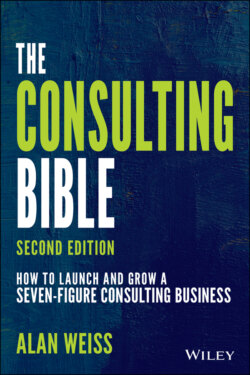Читать книгу The Consulting Bible - Alan Weiss - Страница 48
Case Study: The Pathetic Payment Policy
ОглавлениеSome technology companies have instituted at times 120‐day payment to all venders. Aside from the unethical and despicable policy of penalizing small businesses in order to achieve a four‐month “float” on their money, it's simply unacceptable from a cash flow standpoint.
This is where the buyer comes in. You ensure that your payment terms supercede the policy in place through the buyer's clout. Of course, someone will say, “It's company policy.” Sure it is. But you're allowed to have policies, too, such as more favorable payment terms for you.
If the company “policy” were to loot and pillage, would that be acceptable also?
So how do you tell who the economic buyers are? I say “buyers” because in larger organizations there are scores or even hundreds. I dealt with a dozen different buyers in Merck alone over 12 years. You can't always tell them by title. One of my most significant buyers—he spent $250,000 per year for several years—had the title “International Director of Management Development.” Conversely, some vice presidents can't buy a toothbrush in some organizations (find someone in a bank who is not a vice president).
In smaller organizations, the owner, or CEO, or president will be the buyer. In nonprofits, usually the executive director or managing director is the buyer. However, in most cases, most of the time, you can find the true buyer by asking these 10 questions of the person with whom you're dealing at the moment:
